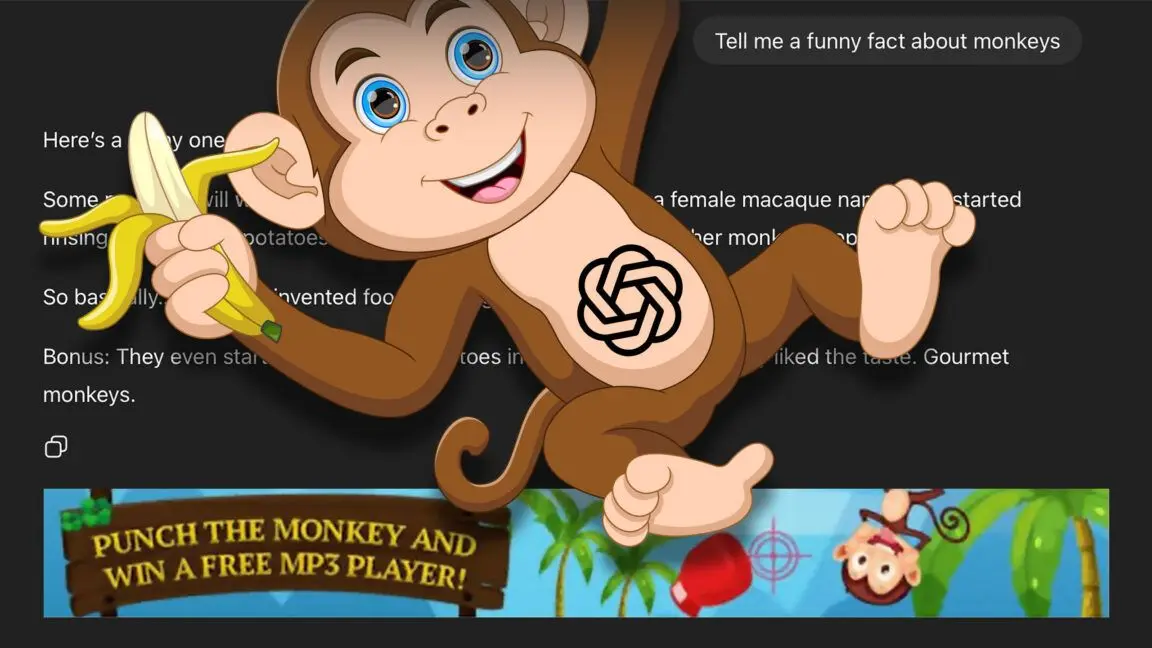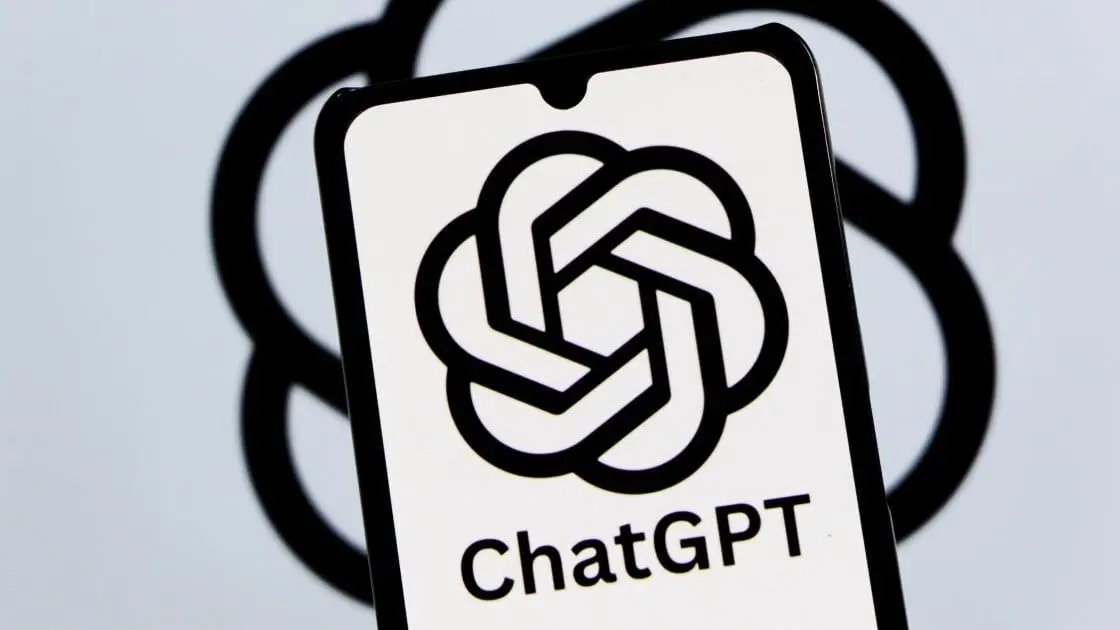Nothing Unveils AI-Powered App Creation Platform, Signaling Shift Towards Personalized Smartphone Experience
12 Sources
12 Sources
[1]
Nothing launches AI tool for building mini apps using prompts | TechCrunch
AI-powered app development is really taking off, and smartphone maker Nothing seems intent on capitalizing on the bandwagon: the company on Monday revealed Playground, an AI tool that lets users create apps with simple text prompts and deploy them to a platform of sorts known as Essential Apps. Currently all Playground lets you build are widgets, like a flight tracker, a next meeting brief, or a virtual pet, from scratch using text prompts, or customize an existing app on the Essential Apps platform to your purposes. More technical users can modify the code to fine-tune how an app works. Nothing says it is not yet letting developers build full-screen apps, as the technology is not currently mature enough. The vibe-coding launch comes mere weeks after Nothing raised $200 million in a round led by Tiger Global. At the time, Nothing CEO Carl Pei said the company wanted to build an operating system with AI-powered features, alongside developing new AI-centric devices. In a conversation with TechCrunch last week, Pei said smartphone makers are reluctant to change software. "Something that has always bothered me is why we aren't improving software? A lot of people look at what big companies like Apple do, and follow that because that is the safer path. I think software iteration is very slow," Pei said. "With breakthroughs in AI, we believe that operating systems will change and become more personal. Our devices have so much context on us, but that is not being leveraged right now," he added. That said, Nothing has so far only launched one AI-enabled app: Essential Space lets users share screenshots, record voice notes, and get transcription for meetings. It's worth noting that most modern smartphone operating systems today can do all of that and more, and if they can't, there's nothing to stop users from simply installing AI apps on their phones. Nothing has made a name for itself as a smartphone manufacturer, but it is still a small company compared to the likes of Google, Huawei, Oppo, Xiaomi, OnePlus, Apple and Samsung. According to data from analytics firm IDC, the company has less than 1% share of the worldwide smartphone market. But Pei feels Nothing's position is advantageous. He has said previously that the company wants to build hardware specifically for using AI, and if it can get it right on smartphones, building hardware with specific use cases would be easier. Vibe coding is promising on paper, but so far, apps that have tried to offer similar functionality on smartphones haven't taken off, per data from analytics firm AppFigures, mostly due to security and maintenance concerns. Pei acknowledged this and said maintaining security while allowing developers to create apps will be crucial going forward. "We have millions of users on our devices. So whatever we ship should be easy to use and hard to make a mistake on. That is why, for us, maintaining a level of security with these apps will be important," he said. At the moment, the company isn't charging for these AI tools, and a paid tier doesn't seem to be in the works right now. Pei mentioned that the focus is on building a vibrant community around the new tool and recognizing people who make good contributions.
[2]
Nothing Phone 3 Update Will Let You Create Apps With AI and Share Them
Expertise Phones |Texting apps | iOS | Android | Smartwatches | Fitness trackers | Mobile accessories | Gaming phones | Budget phones | Toys | Star Wars | Marvel | Power Rangers | DC | Mobile accessibility | iMessage | WhatsApp | Signal | RCS Nothing's next big AI focus could be replacing the entire Google Play Store. The phone-maker on Tuesday launched new features that will let Nothing Phone 3 owners generate new apps, widgets and other settings through prompting an AI, which will then build and ideally run them on the phone. If the AI creation functions particularly well, you could publish them for others to download. These features consist of the Nothing Playground -- which lets you generate these new functions -- and Essential Apps where they can be published and downloaded by others. In a demo provided by Nothing's AI lead Sélim Benayat, I watched somebody prompt the AI to generate a "face" for the Glyph Matrix secondary display on the back of the Nothing Phone 3. The instructions clearly stated that the face needed to be made of two circular shapes that resemble eyes, which then bounce around. It's a simple graphic, but it proved that the AI could generate this and then make it available to transfer onto a phone. You could even remix these creations. For instance, if I wanted those eyes to be in another color, I could theoretically use the Playground to request the same graphic but in my preferred shade. At launch, Nothing's Essential Apps feature a mix of simple functions like a flight reminder tool, a Flappy Bird-like game and a widget for tracking your hydration. Essential Apps is launching in an alpha state, but Benayat said that the tool can theoretically develop more advanced tools based on the prompts. That said, there is no guarantee that the app-generated feature will run on the phone at this early stage. However, the code generated by Playground is available for anyone with app development skills who wants to continue building an app manually from there. Nothing's Playground and Essential Apps are said to be a step toward the company's eventual goal of creating an AI-focused operating system. For now, though, Playground and Essential Apps run on Nothing OS 4, which is based on Android. These features are also currently exclusive to the Nothing Phone 3 series, but the apps may be available on earlier devices depending on the available memory. This idea is similar to the Rabbit R1, an app-less device for answering questions or completing tasks, such as ordering food, using AI prompts. The device received mixed reviews when launched in 2024, but its performance steadily improved. The R1 received an overhaul to its operating system earlier this month that makes better use of its touchscreen.
[3]
Nothing's new AI OS isn't really an OS, or new
Nothing says it has just taken "the first step towards an AI-native operating system." Not exactly. Playground, Nothing's new app store filled with user-designed, AI-generated apps, is neither Nothing's first step, nor is it an operating system -- it's built on Android. But the idea lands, and beneath the hype, it is genuinely exciting -- a glimpse of smartphones that feel more personal and adaptable, with a clear vision for where this might go in the future. The bold proclamation of an AI-native OS centers on the launch of Essential, which Nothing says brings us closer to a world "where devices adapt to people, not the other way around." In plain speak, Essential is Nothing's "name for all our AI-related products," founder and CEO Carl Pei tells The Verge. Despite the London startup claiming to be unveiling Essential today, the line actually has several products live already, including an AI search tool and Essential Space, which organizes voice notes and images. What's really new is Playground, and with it Essential Apps. Playground is basically Nothing's take on an app store. Filling it will be apps designed in Essential Apps, an AI-powered tool that can build simple apps from written prompts alone. In short, users can design their own apps for their own needs. Nothing suggests a mood tracker that syncs with a music playlist, a receipt-to-expenses-form pipeline, or an app that can suggest what to wear based on your wardrobe and upcoming appointments. It's clear this is the early stages of what Pei imagines as a much larger ecosystem, making some of Nothing's "first step" comments make more sense. At the moment, you can only design widgets, which obviously limits what they can do. Apps must also be created on a web platform with written inputs, at which point creators can install them on their own phones or add them to Playground for others to download. It's available exclusively to Nothing phones, with the exception of the Phone 1, which Pei says no longer receives major updates so can't install the new apps. Over time, Pei tells The Verge this process of app creation will become "more and more seamless," taking place directly on the phone itself and perhaps by just speaking. Widgets are not the end game either, Pei says, forecasting more capable apps that take up the entire screen, comparable to the standard apps we have today. There are also the kernels of what could become a new creator economy, if the idea takes off. Playground lets users take and remix apps others have made, building and evolving in a similar fashion to the open source community does today. For someone who speaks a lot about the moats smartphone giants Apple and Google have built around their app stores, Pei claims he is not thinking about how to monetize the store yet. "I think it needs to reach a certain level of scale before we can turn on whatever business model we have," he says, adding that "YouTube could be a good example of where it could potentially go" for creators. Eventually -- and here's where the AI-native OS idea comes in -- Pei says phones could be more proactive, changing apps' placement, or even suggesting apps based on how we use the phone. But even then, this is not an OS. It is an interface. Pei admits as much, leaning on semantics to skirt the issue: "I guess the word or the noun 'OS' could be interpreted in different ways." Pei tells The Verge Nothing has no intention of abandoning Google's Android, the system on which its products are currently built. "We're not touching the lower level code," he says. "Android is a great platform to build upon, and Android already has a rich developer ecosystem," Pei explains. People will still need to download apps like Instagram or Tiktok when starting up their phones, after all. It's an exciting new feature and potentially a new and exciting creator economy. But there is a long way to go before Nothing can truly go it alone. In a departure from the hyped AI-powered gadgets like Rabbit's R1 or OpenAI's partnership with former Apple designer Jony Ive, Pei is not promising to do away with the smartphone just yet. It is clear Pei believes phones are here to stay when he asks himself, "When am I ready to say goodbye to apps?" and answers: "You know, not anytime soon."
[4]
Nothing Phones Now Let You Build Personalized Apps With AI
With over a decade of experience reporting on consumer technology, James covers mobile phones, apps, operating systems, wearables, AI, and more. Don't miss out on our latest stories. Add PCMag as a preferred source on Google. A new AI tool for Nothing Phones will soon let you build your own apps, which can be added to a phone's home screen. These Essential Apps are available via a new platform called Playground. Nothing suggests putting in prompts like "capture the receipts from camera roll, and export a finance-ready PDF every Friday" to build a tool tailored for you. Another example from Nothing reads, "before my calls, show me a one-page brief based on my calendar and message threads." Playground also serves as an alternative app store for these AI tools, so you can download creations from other users. There are currently 40 Essential Apps available on Playground; the most recommended tool is an app called Big Eyes, made by Nothing CEO Carl Pei. Other choices in the top 10 include a Tic-tac-toe game, a flight reminder tool, various clocks and calendar integrations, a schedule for Formula 1 races, and a game similar to Flappy Bird. Essential Apps remain in alpha for now and are currently limited to Nothing devices. You'll need Nothing OS 4, which is the brand's version of Android 16, launching today in an open beta. We don't yet know when the final software will be made available. This also means Essential Apps won't be available on the first-gen Nothing Phone, as that's set to miss out on the upgrade. All other Nothing phone products will support the service, but you need to join the alpha through a waitlist. To keep your phone running smoothly, Nothing has also introduced a "temporary" limit on the number of Essential Apps you can have running at a time. The Nothing Phone 3 supports up to six widgets, while all other models are limited to two. Essential is the brand name for Nothing's AI-powered tools, and it says this is the first step toward "a new kind of AI-native operating system." The brand first launched its Essential Space earlier this year, which acts as an AI-powered hub for recording notes and more. "With Essential, we begin to chip away at the outdated and elitist system set up by the legacy market leaders," says Pei. "A new era requires new thinking. The future of software will be one of unrestricted access, collective innovation, and hyper-personalization. Moats of the past will be dismantled, opening the door to a truly user-led future." Eventually, Essential OS will become the core of Nothing products. A note on Nothing's website states that it will launch in the first half of 2027, although we've yet to learn any of its key features. Nothing says it will bring "The future of personal computing with AI at its core." The same section of Nothing's website says the brand will launch its first range of AI-native devices in the second half of 2026. Nothing says it will be "pairing software experiences with new use case specific shaped devices."
[5]
Nothing wants to turn your ideas into widgets as it teases an AI OS
Nothing is stepping into the AI spotlight with a new experiment it's calling Essential Apps and Playground, two features designed to make your phone feel more flexible, personal, and, at least in theory, smarter. While Carl Pei, the company's founder, talks about this as the start of an "AI OS" in an interview with The Verge, it's not a replacement for Android. Instead, it's a creative layer built on top of Google's system, where AI takes center stage in how apps are built and used. The idea is simple but ambitious. You tell the AI what you want, and it creates a mini-app that you can add to your home screen. These Essential Apps work like widgets, such as a countdown timer, a hydration tracker, or a calendar reminder, and you can make them using plain text prompts. They are lightweight and limited for now, but they offer a new way to use your phone. The companion tool, Playground, serves as a community hub where users can create, edit, remix, and share these AI-generated widgets. For power users, Playground exposes some of the underlying code, so you can fine-tune what AI generates. Right now, Essential Apps are not full-screen apps because Nothing says the technology is not ready yet. The company sees this launch as a first step, hoping to build an ecosystem before adding more advanced features. For now, only Nothing devices can use these features. The new Nothing Phone 3, with the beta version of Nothing OS 4.0, supports up to six widgets. Older models are limited to two, and the original Phone 1 is not included since it no longer gets major software updates. A smarter, adaptive phone experience Pei describes Essential as the umbrella for Nothing's AI efforts and hints at a longer-term vision where phones could feel more dynamic by adapting layouts, anticipating your needs, and reshaping the experience based on context. He admits that calling it an AI OS is more aspirational than literal. Nothing's software still relies on Android at its core, but the way AI changes the layer on top is what's new. Interestingly, Nothing isn't charging for any of this yet. The company's focus is on getting users to play, experiment, and share. Monetization, Pei says, can come later once the ecosystem has momentum. Alongside Essential Apps, Nothing already offers Essential Space, a collection of AI-powered utilities, including voice note transcription, screenshot sharing, and meeting summaries, although these are similar to what rivals already provide.
[6]
Nothing launches 'Essential' which generates 'apps' with AI and, one day, will be an OS [Video]
Nothing has been teasing an operating system built for AI and, today, they're showing that off with "Essential" and it's... a lot. "Essential" is, by Nothing's description, a "new kind of operating system." The idea is to build something that's unique to each user, but the full vision for this is a long-term one, and we won't see the debut until the first half of 2027. In the meantime, "Essential Apps" are launching on Nothing Phone devices running the Nothing OS skin on top of Android. This new feature leverages the newly available "Nothing Playground," where "Essential" will produce custom apps on demand using AI. No coding is needed, just descriptions fed to AI. Once an app is generated, you can add it to your homescreen and start using it. Nothing says: That journey starts with the launch of Essential Apps for Nothing devices. Just describe what you need - 'capture the receipts from camera roll, and export a finance-ready PDF every Friday', 'before my calls, show me a one-page brief based on my calendar and message threads', 'create a mood tracker that syncs with a music playlist' - and AI generates an Essential App you can add to your home screen instantly. The destination is a future where your phone shapes itself based on who you are: a personal OS. These aren't "apps" though, but rather homescreen widgets. The "Nothing Playground" is live now and some of the initial "app" examples include a flight gate reminder, a date widget, a clock widget, an F1 calendar widget, and one that just has "big eyes." The Playground will allow users to create their own widgets or add ones created by other users. There's also a limit on how many of these you can use. Nothing Phone (3) running Nothing OS 4.0 (now in beta) supports up to 6 widgets, while all other Nothing Phone models on the same update only support 2 at a time. Nothing is making a lot of big promises for its future here, so what do you think of what's been presented?
[7]
Nothing will let you build mobile apps in a Biblically easy way
Hey Playground, make an app that curses me if I don't hit my water intake target. Thanks! Will an app into existence, and Nothing shall let you do it. With some help from AI. That's more or less the future of software experience on Nothing smartphones. Earlier this year, Nothing wowed us with Essential Space, an app that serves somewhat like a digital memory bank and makes generous use of AI. Today, the company is pushing the vision further with Essential, a full-fledged AI platform where users can create and share apps by describing them. The big shift Think of Essential as a digital playground. Here, you can share everything from AI-generated mobile apps to camera filters and sound equalizer profiles. Vibe coding, for mobile, on mobile, if I may put it that way. At the center of it all is the new Essential Apps for Nothing smartphones. Recommended Videos All you have to do, in order to create a hyper-specific and deeply personal app, is say it in natural language. Think of it like talking with a chatbot. For example, you can create apps by simply describing their premise as follows: "Scan business cards from the gallery and make a searchable directory, updating every week." "After meetings, email me action items extracted from my calendar and recent notes." "Build a daily photo diary from my camera roll, organising images by mood and tagging locations." These apps are ready to deploy without any technical hassles. As soon as the app is created, you can directly add it to the home screen and begin using it. The premise is too different from custom GPTs for ChatGPT, Gems created using Gemini, Skills in the AI-powered Dia browser, or Shortcuts in Perplexity's Comet browser. The hot premise Nothing is giving users an unprecedented level of flexibility over their mobile experiences. Instead of creating obscure shortcuts, they can now simply create apps for each task. But most importantly, they can openly share these apps within the community. This is nothing short of opening the creative floodgates for mobile users. Aside from sharing apps, users can also download and iterate on those created by others. The whole process of creating apps is tied to the Playground, a dedicated space with its AI-powered development toolkit. Playground is widely available for all Nothing smartphone users, and there are already plenty of apps created by the community, including one from the company's founding chief, Carl Pei. At the moment, the Playground repository has user-generated apps that handle everything from shadowing a visual moon crescent progress and curating news to tracking water intake.
[8]
Nothing OS 4.0 Hits Open Beta With Essential Apps You Make With AI
We may earn a commission when you click links to retailers and purchase goods. More info. We have a couple of big announcements to talk through today from Nothing. For one, Nothing has released the Nothing OS 4.0 Open Beta (Android 16) for those with a Nothing phone and who want to test out Android 16 before it goes stable. The other news is related to that, as it introduces Essential Apps and the Playground, both of which are going to need us to explain further. In short, this is a pretty cool idea from Nothing. Nothing OS 4.0 Open Beta Download: OK, so first off, we have Nothing OS 4.0 in beta. You need a Phone 3 or any of the Phone 2 and 2a models to be able to get this. So far, they haven't mentioned the Phone 3a devices, so if you own one of those, you just may be out of luck at the moment. In the Nothing OS 4.0 beta, you'll find several changes, all of which we've listed out in this post. Things like a refined design, an extra dark mode, better app optimization, improved photography experience, and "general" improvements are all in there. In today's announcement, Nothing also called out a new Pop-up View, two new lock screen clock faces, and 2×2 Quick Settings tile support. To get started, assuming you like testing beta software, you'll head to this post and follow the mostly-simple instructions that involve installing the Nothing Beta Updates app, joining the beta through it, and then installing the beta software. Nothing Essential Apps and Playground: In more interesting news, because we like new ideas, Nothing has launched the Playground and Essential Apps that live within it. The Playground is essentially a community storefront of apps, Glyph Toys, camera presets, and EQ profiles that you can install on your Nothing device if it's running Nothing OS 4.0. While that idea may not be that new or exciting to you , it's the apps and where they come from that might be. Nothing has created a web portal that allows you to create your own apps that can be installed as widgets on your Nothing phone. You head to the Nothing Playground site (here) and attempt to describe an app you'd like on your phone. In other words, you would be describing an app or action that might be useful as a widget that isn't already available on your device. If the AI on this Playground site can make it, it'll do so and then let you install it on your device. Since this is all happening from AI prompts, you don't need to learn to code to do this - you just need an idea that you can clearly define in a prompt that AI could understand and then create from. You can view the code it spits out, though, in case you were wondering. This is all an early "alpha" of sorts, with some clear limitations. Nothing has said that it'll expand and add APIs, agents, and integrations in the future that will hopefully turn this into something insanely cool. Some of the apps currently on the Playground include things like a Tic Tac Toe app, F1 schedule, a water intake tracker, flight reminder, solar clock, mini calculator, and a breathing tracker. Look, those might not be a bunch of things you don't already have in some form from other apps, but the idea is you could think of something in the moment that might be handy, and then tell the Playground to make it. That could then show up on your home screen and be ready to use in a matter of minutes. That idea is a big one. To fully expand the availability of apps and ideas, you will be able to share your apps publicly on the Playground and download those from other members.
[9]
Nothing's Essential AI Platform Lets You Build Apps Just By Asking - Phandroid
Nothing just dropped something big. The company announced Essential, a new AI platform that feels like a mashup between Apple's Siri Shortcuts and vibe coding. But instead of manually building automations or wrestling with prompts, you just tell it what you want and it creates a personalized app for you. Essential is Nothing's answer to the one-size-fits-all approach that's defined smartphones for years. Instead of downloading apps built for millions of people, you create apps built specifically for you. Need an app that captures receipts from your camera roll and exports a PDF every Friday? Just ask. Want something that shows you a brief before calls based on your calendar and messages? Done. The platform launches with two main components. Essential Apps lets you describe what you need in plain English, and the AI generates a working app you can add to your home screen. The second piece is Playground, a community platform where users can download, share, and remix apps created by other Nothing users. Think of it as the App Store meets GitHub, but powered by AI. You're not limited to what developers decide to build. If you have a specific need, you can create the tool yourself without writing a single line of code. Nothing showed off some examples during the announcement. Users in the alpha program built mental health trackers, family organizers, and custom productivity tools. These aren't templates or pre-made apps. They're personalized tools created for specific needs. CEO Carl Pei framed Essential as a challenge to the traditional app ecosystem. "With Essential, we begin to chip away at the outdated and elitist system set up by the legacy market leaders," Pei said. "The future of software will be one of unrestricted access, collective innovation, and hyper personalisation." It's a bold statement, but Nothing has some credibility here. The company shipped millions of devices and hit over $1 billion in sales in just five years. That's not easy in a market dominated by Apple and Samsung. The bigger vision is Essential OS, a full operating system built around AI from the ground up. Essential Apps and Playground are the first steps toward that future. Nothing wants your phone to adapt to how you actually use it, not force you into someone else's idea of how a phone should work. There's always a catch with ambitious AI promises. Nothing didn't share details about what happens to your data when you create these personalized apps. If the AI needs access to your calendar, messages, and photos to build useful tools, that raises privacy questions. The company also didn't explain how Essential Apps will handle more complex requests. Can it integrate with third-party services? What happens when the AI misunderstands what you want? These are questions we'll need answers to once Essential rolls out more widely. Playground sounds great in theory, but community-driven platforms can get messy fast. Nothing will need strong moderation to prevent spam, malicious apps, or low-quality creations from flooding the platform. Nothing didn't announce a specific launch date beyond "today" for Nothing device owners. If you own a Nothing phone, you should be able to access Essential Apps and Playground now. The company hasn't said when or if this will expand to other Android devices. This feels like Nothing's biggest software bet yet. If it works, it could genuinely change how we think about apps and operating systems. If it doesn't, it'll join the long list of ambitious AI platforms that promised personalization but delivered disappointment. Either way, it's refreshing to see a company trying something different instead of just copying what Apple and Google are doing.
[10]
Nothing Will Soon Allow You to Build Your Own Apps on Its Smartphones
Nothing on Tuesday announced its first step towards an AI-native operating system. The Carl Pei-led company introduced Essential -- a vibe coding suite of applications aimed at artificial intelligence (AI) focussed devices. The company will allow users to create their own Essential apps using natural language commands, which will be available via a new community-driven app store called Playground. The existing Essential Space app has also been further enhanced with the introduction of Essential Memory. Nothing Will Also Let Users Share Essential Apps In a community post, Nothing said that its new suite uses AI to instantly generate Essential apps that can be added to the home screen. These apps are aimed at building a "hyper personalised" smartphone experience, where the phone can shape itself around the user's personality. Essential appears to be Nothing's iteration of a vibe coding platform, where large language models (LLMs) generate most of the code from natural language prompts. Creators can enter text-based commands, and the AI will generate an application or a program. They can then accept the AI-generated suggestions and provide iterative and conversational feedback to fine-tune it. For example, users can ask the AI suite to capture the receipts from the camera roll and export a finance-ready PDF regularly. Or, generate a mood tracker that automatically syncs with a music playlist. These, and many other Essential apps can be created by users by simply describing what kind of application they require, as per the company. Nothing said that Essential apps are designed to be lightweight and efficient. There is a temporary limit on how many such apps can be used with the upcoming Nothing OS 4. On the flagship Nothing Phone 3, users can create up to six widgets. Other models support up to two. Essential apps are currently in alpha stage and there is a waitlist for early access. In addition to creating their own apps, Nothing users can also create apps to share with the community or download existing ones generated by others. This is possible through a new community-driven hub called Playground. Essential's Playground is a community-driven hub, says Nothing Photo Credit: Nothing As per the company, this space is not bound by the same restrictions as traditional app stores, and users are free to contribute and download creations by the community. They can explore Essential apps, Glyph Toys, Camera Presets, and EQ profiles. While downloading is straightforward, users will need to apply for creation permission on the Nothing website if they wish to contribute to the storefront with Essential apps of their own. Nothing added that Essential marks its first step towards an AI-native OS, by turning foundational AI into hyper-personalised experiences that help in daily life. Memory Feature Enhances Essential Space With the Nothing Phone 3a series, the UK-based company introduced Essential Space. It serves as a one-stop solution to gather all sorts of data, such as screenshots, photos, and voice notes, and recall them using AI. Nothing is now adding a new feature to this, dubbed Essential Memory. As per the brand, it collates information by learning the user's habits and surfaces forgotten details when most required. Nothing emphasised that the data is stored locally on-device unless chosen otherwise, and it will provide transparency for tasks that rely on the cloud.
[11]
Nothing launches Essential AI platform, aims for AI-native OS
Nothing has unveiled Essential, its new AI platform intended to serve as the foundation for a future personal operating system. The platform launches with two main components: Essential Apps, which allows users to create personalized applications using natural language, and Playground, a community-based hub for sharing and remixing these creations. Nothing recently secured $200 million in a Series C funding round to support the company's new strategic direction: developing an AI-native platform that integrates hardware and software into a single system. The company's long-term vision is for Essential to evolve into Essential OS, described as a "truly AI-native operating system." This initiative aims to shift away from the current one-size-fits-all approach of mobile operating systems, which Nothing characterizes as "built to monetise attention instead of amplify creativity." The initial launch focuses on Essential Apps, a tool that enables Nothing device users to generate applications by describing their needs. The company provided several examples, such as creating an app to "capture the receipts from camera roll, and export a finance-ready PDF every Friday" or one that "before my calls, show me a one-page brief based on my calendar and message threads." Once generated, these apps can be added directly to the user's home screen. These creations will be housed within Playground, a platform designed for building, sharing, and downloading community-developed apps. Nothing positions Playground as an open alternative to traditional app stores, leveraging the creativity of its user base. Nothing frames this move as a shift from mass-market software to personal creation, enabled by AI's ability to reduce the complexity and cost of building software. According to the announcement, an alpha version of the platform has already seen community members create hundreds of apps for specific needs, ranging from mental health trackers to family organizers. The company highlighted its position as an independent platform, having shipped millions of devices and generated over $1 billion in sales. Nothing argues that its independence allows it to build an open ecosystem, free from the incentives that maintain the "status quo." The company also emphasized that an integrated hardware and software approach is necessary to deliver the truly personal context required for such an OS. Ultimately, Nothing describes the goal of Essential as fostering a more "balanced relationship with technology," where AI complements user strengths and gives back time, rather than creating more digital distractions. Essential's Playground is now open to everyone at playground.nothing.tech. Essential Space is available on Nothing and CMF phones for capturing ideas and organizing inspirations, and Essential Search for finding information quickly. Nothing has now announced an upcoming feature, Essential Memory, which it says will learn user habits to surface forgotten details at relevant times. The company emphasized that the entire suite is private by design, with user data remaining on the device by default unless cloud access is explicitly chosen.
[12]
Nothing unveils Essential AI platform that lets you create personalised apps: Check details
Essential Apps let users create their own apps instantly using natural language. Nothing has introduced its new AI platform called Essential, marking the start of the company's vision for a future personal operating system. The platform aims to make technology more personal, adaptive, and truly under the user's control, moving away from one-size-fits-all apps and systems that focus more on attention than creativity. At the core of this launch are two key features: Essential Apps and Playground. Essential Apps let users create their own apps instantly using natural language. For example, you could ask your phone to "capture receipts from my camera roll and export them as a weekly finance-ready PDF" or "show a one-page briefing before my calls based on my calendar and messages." AI will generate an app tailored to your request, which you can add directly to your home screen. Also read: Apple iPad Pro with M5 chip leaks in unboxing video: Here's what to expect Playground is a community-driven platform where users can share, remix, and download apps created by others. It's designed to encourage creativity, allowing anyone, not just professional developers, to build tools that meet specific personal needs. In the alpha version, the Nothing community has already created hundreds of Essential Apps, ranging from mental health trackers to family organisers. "With Essential, we begin to chip away at the outdated and elitist system set up by the legacy market leaders. A new era requires new thinking. The future of software will be one of unrestricted access, collective innovation, and hyper personalisation. Moats of the past will be dismantled, opening the door to a truly user-led future." said Carl Pei, CEO of Nothing. Also read: OpenAI launches Sora 2, its most advanced video generation model yet alongside TikTok-like social app Nothing's track record as an independent platform shows it can compete with established tech giants. In just five years, the company claims to have shipped millions of devices and generated over $1 billion in sales.
Share
Share
Copy Link
Nothing, the smartphone maker, launches Playground and Essential Apps, allowing users to create custom widgets using AI prompts. This move is part of the company's vision for an AI-native operating system, aiming to make devices more adaptable to users' needs.
Nothing's AI-Powered App Creation Platform
Nothing, the innovative smartphone maker, has taken a significant step towards revolutionizing the mobile app ecosystem with the launch of its AI-powered app creation platform. The company unveiled Playground and Essential Apps, two features designed to make smartphones more flexible, personal, and intelligent
1
2
3
.
Source: Digit
Playground and Essential Apps: Empowering Users
Playground is Nothing's new AI tool that allows users to create custom widgets and mini-apps using simple text prompts
1
. These creations, called Essential Apps, can be added to the phone's home screen and serve various functions, such as flight trackers, meeting briefs, or virtual pets1
2
.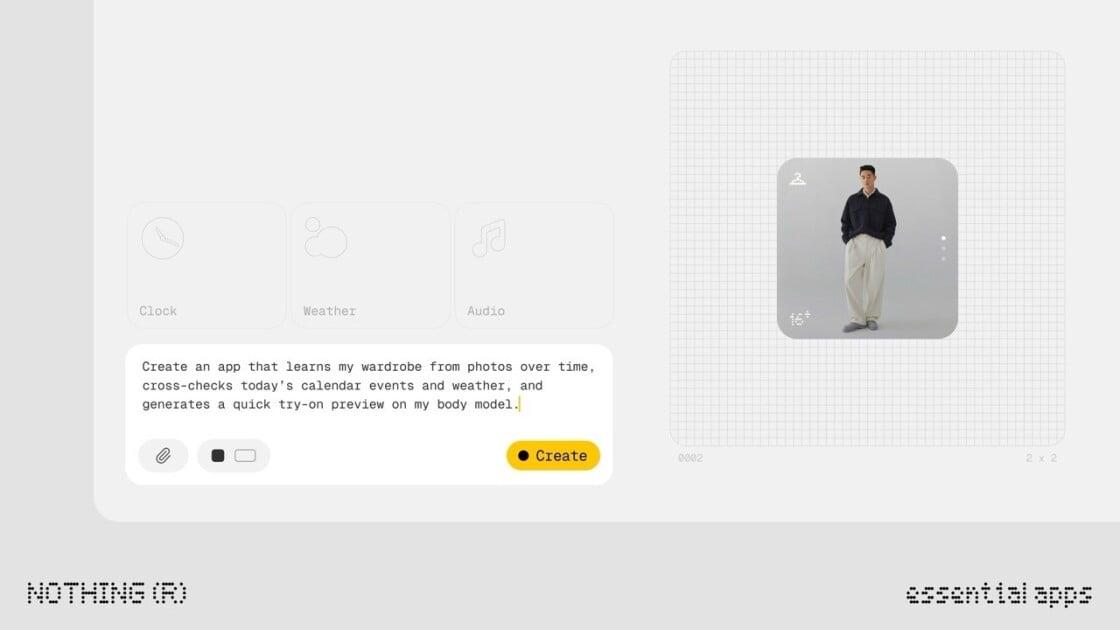
Source: PC Magazine
Currently, the platform is limited to creating widgets, but Nothing CEO Carl Pei has hinted at future expansions to full-screen apps
3
. The company envisions a future where app creation becomes more seamless, potentially allowing users to create apps directly on their phones through voice commands3
.Community-Driven Innovation
Essential Apps also serves as an alternative app store, where users can download and remix creations from other community members
2
3
. This approach fosters a collaborative environment, similar to the open-source community, and could potentially lead to a new creator economy3
.Technical Limitations and Future Plans
At present, Essential Apps are exclusive to Nothing devices running Nothing OS 4, which is based on Android 16
4
. The Nothing Phone 3 supports up to six widgets, while older models are limited to two4
. The original Nothing Phone 1 is not included in this update3
.Related Stories
AI-Native Operating System: A Vision for the Future
Nothing positions this launch as the first step towards an AI-native operating system
3
5
. While the current implementation is built on top of Android, the company aims to create a more adaptive and personalized smartphone experience in the future3
.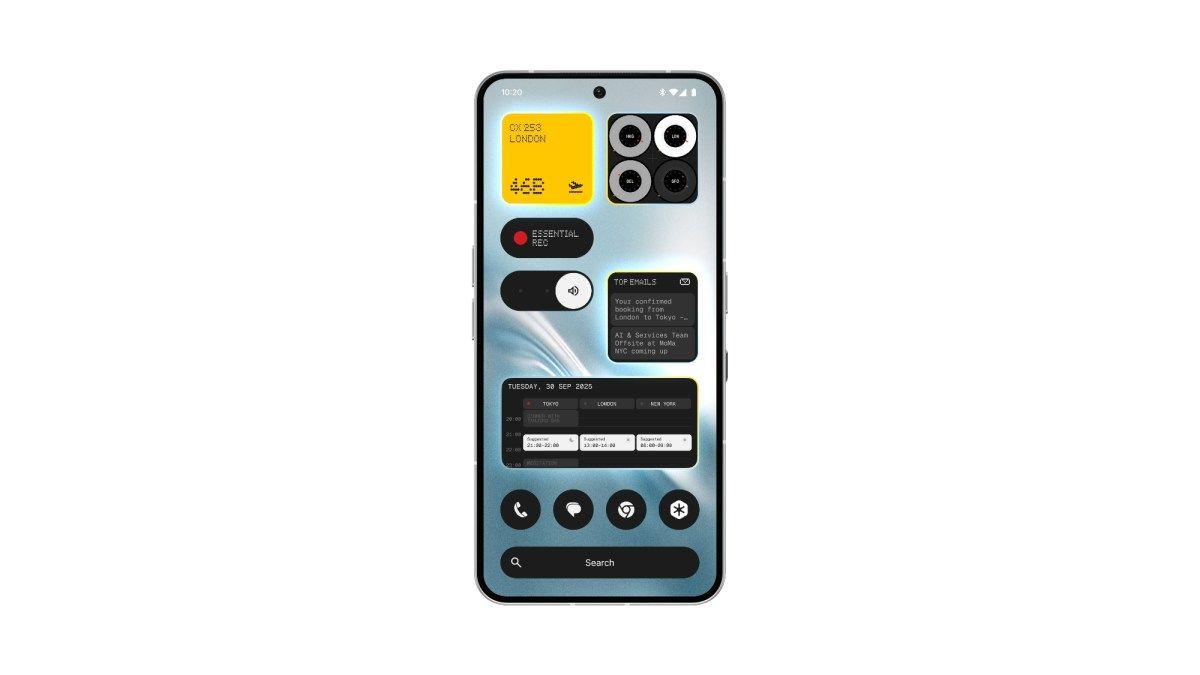
Source: TechCrunch
Carl Pei envisions phones becoming more proactive, potentially changing app placements or suggesting apps based on user behavior
3
. However, he clarifies that Nothing has no intention of abandoning Android, acknowledging its rich developer ecosystem3
.Industry Impact and Future Prospects
This move by Nothing represents a significant shift in how smartphones could adapt to user needs. By allowing users to create custom apps tailored to their specific requirements, Nothing is challenging the traditional app store model dominated by tech giants
3
5
.As the technology matures, Nothing plans to launch its first range of AI-native devices in the second half of 2026, with a full AI-native operating system expected in the first half of 2027
4
5
. These developments could potentially reshape the smartphone industry, offering users unprecedented levels of personalization and adaptability.While the current implementation is still in its early stages, Nothing's vision for an AI-powered, user-centric smartphone experience marks an exciting development in the evolution of mobile technology.
References
Summarized by
Navi
[3]
[4]
[5]
Related Stories
Nothing Essential Apps enters beta, letting users vibe code widgets with AI-powered prompts
10 Feb 2026•Technology
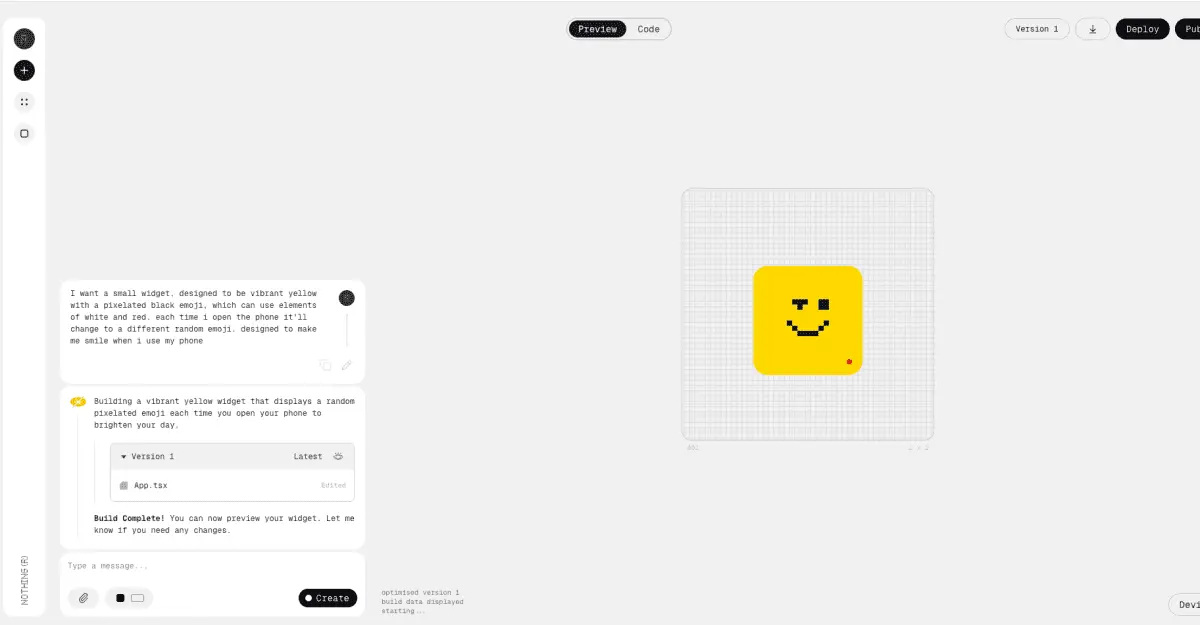
Nothing's Bold AI Vision: New OS and 'AI-Native Devices' Coming in 2026
17 Sept 2025•Technology
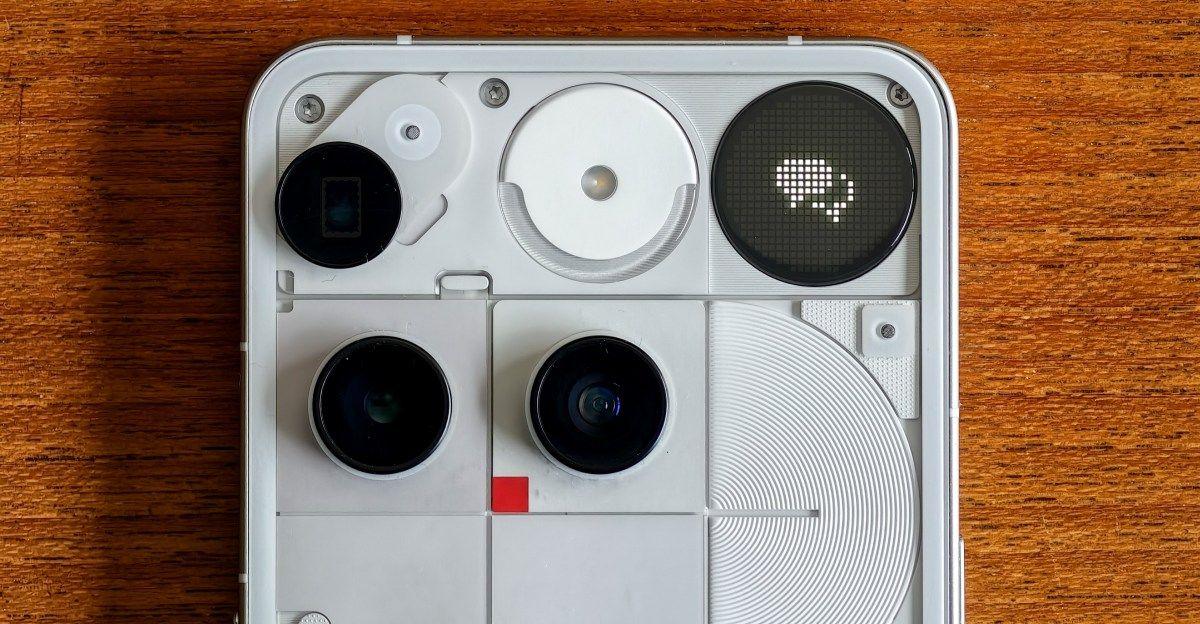
Nothing CEO Carl Pei Envisions AI-Driven Future of Smartphones Without Apps
28 May 2025•Technology

Recent Highlights
1
Anthropic releases Claude Opus 4.6 as AI model advances rattle software stocks and cybersecurity
Technology

2
University of Michigan's Prima AI model reads brain MRI scans in seconds with 97.5% accuracy
Science and Research

3
UNICEF Demands Global Crackdown on AI-Generated Child Abuse as 1.2 Million Kids Victimized
Policy and Regulation


